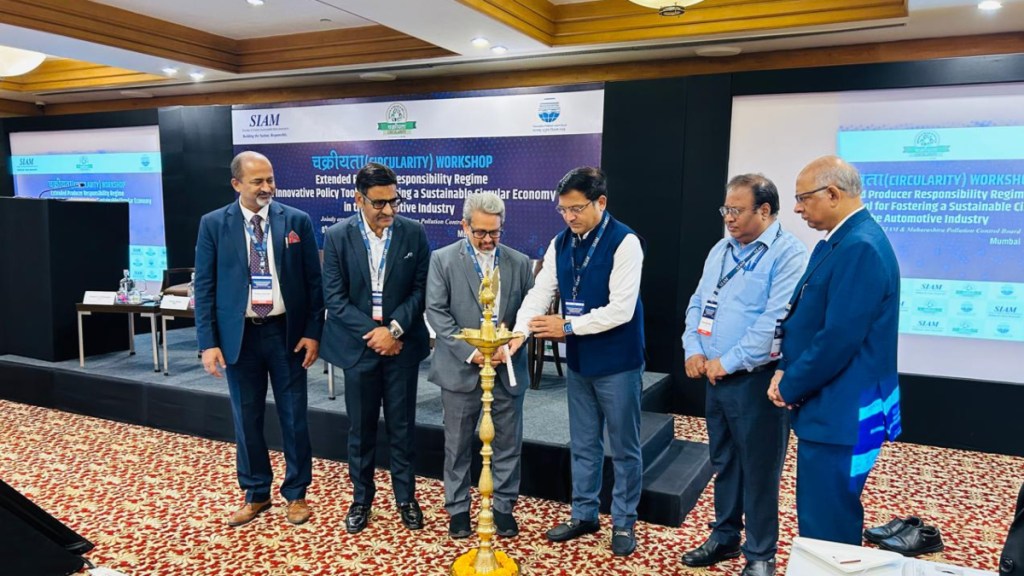The Society of Indian Automobile Manufacturers (SIAM), the apex body for the automobile industry, collaborated with the Maharashtra Pollution Control Board to jointly organise a ‘Circularity Workshop’ on ‘Extended Producer Responsibility Regime: An Innovative Policy Tool for Fostering a Sustainable Circular Economy in the Automotive Industry.’
The workshop was conducted on April 8, 2024 in Mumbai, under SIAM’s Chakriyata initiative, which aims to facilitate meaningful discussions and develop actionable strategies for sustainable mobility through waste management, recycling, and other circularity principles.
The workshop served as a platform for industry stakeholders and government representatives to converge, fostering insightful discussions on the benefits and challenges associated with implementing Extended Producer Responsibility (EPR) within the automotive sector. With a focus on catalysing sustainable practices, the event aimed to garner valuable insights into leveraging EPR as a strategic mechanism towards achieving a circular economy in the automotive industry.
The Inaugural session was opened by Prashant K Banerjee, Executive Director, SIAM, highlighting the commitment of auto industry towards sustainability. He mentioned that SIAM through its Chakriyata initiative has been focusing on promoting the recycling ecosystem within the country. Further, he also mentioned that this event, which brings together all key stakeholders in the automotive recycling ecosystem, will help in developing new ideas and ensuring alignment to ensure achievement of government’s circularity vision.
Sushant Naik, Chairman, SIAM Electric Mobility Group and Global Head-Government & Public Affairs, Tata Motors, expressed, “SIAM Chakriyata’s vision is to harmonise economic growth, environmental integrity, and social equity in the automotive industry. Through the Extended Producer Responsibility framework, our focus is to minimise waste and maximise recycling efforts, paving the way for a sustainable future.”
Sanjay Mehta, President, Material Recycling Association of India, addressed on Imperatives of the EPR Regime in India, presented the recyclers’ view. He further stated that the RVSFs and OEMs in India need to work together to solve the key issues impacting the sector.
Anand Kumar, Director &. Divisional Head, WM-III Division, Central Pollution Control Board (CPCB), presented CPCB’s perspective on the different EPR norms that have come out in recent years including that for ELVs, tyres, batteries and e-waste. He further stated that the regulators and industry should work together with a problem-solving mindset which will help in resolving key issues and ensure the development of recycling ecosystem in the country.
Vijay Prakash Yadav, Director, Central Pollution Control Board (CPCB), and M S Anandkumar, Chairman, SIAM Recycling & Material Group and Senior General Manager, TVS Motor Company, were also present in the session.
During the 2nd session of the workshop was themed on “EPR Regime in ELV Management & Tyre Waste”. Bharat Kalaskar, Joint Transport Commissioner, Transport Department, Govt of Maharashtra highlighted his views on ‘Phasing out of End-of-Life vehicles & their impact on ambient air quality.’ Yash Pal Sachar, Vice President, Ashok Leyland discussed on ‘EPR Regime in Automotive Sector’.
The session further featured thematic presentations by Sumit Issar, MD, Mahindra Accelo on ‘Technological Innovations in ELV Recycling and Resource Recovery at the level of RVSF’, and Prabhakar Tiwari, General Manager, Tata Motors on ‘Implementing Extended Producer Responsibility (EPR) in the Automobile: Challenges and Solutions at RVSF level’.
Dr. Anuraddha Ganesh, Chief Technical Advisor, Cummins, presented on ‘Circular Economy Strategies: Aligning ELV Policies with Sustainable Practices’, wherein she talked about the importance of designing for recycling, the need for using recyclable materials, along with concept of remanufacturing of automotive parts, which can increase the useful life of parts, thus aiding resource conservation. The session also saw Dr Rashi Gupta, Founder & Managing Director, Vision Mechatronics sharing her thoughts on ‘Battery Waste management’, wherein she highlighted the importance of battery recycling, given the increase in EV sales and battery usage of energy storage.
The third session of the workshop focused on ‘EPR Regime in Battery Waste & E-Waste’. Rujuta Bhalerao, Sub Regional Officer, MPCB, provided MPCB’s perspective on battery and e-waste management, along with the detailing the recycling ecosystem in Maharashtra.
Additionally, Vijay Prakash Yadav, Director at CPCB, shared his perspectives on \Implementation of Battery Waste Management rules and Trading Mechanism of EPR Certificates at CPCB Portal’.
The last session further featured thematic presentations by Prabhakar Tiwari, General Manager, Tata Motors who talked about ‘Battery waste management rule’ and M S Anandkumar, Chairman, SIAM Recycling & Material Group and Senior General Manager, TVS Motor Company, who presented his view on the EPR regime, key challenges and how it can help drive circularity.



















